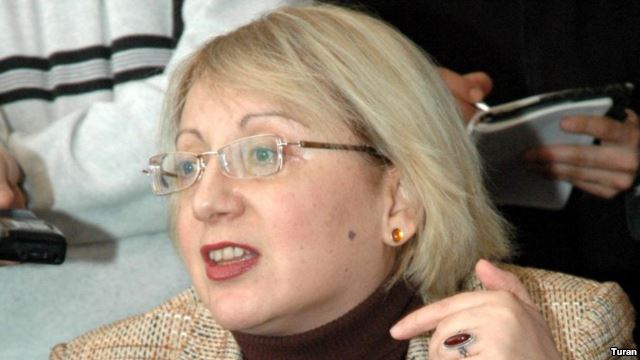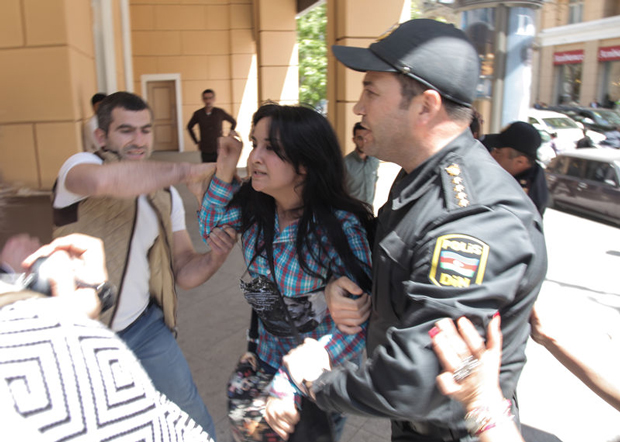30 Jul 2014 | Azerbaijan, Azerbaijan News, News and features

UPDATE 30 July 17:30 pm
Leyla Yunus has been charged with “high treason (article 274), tax evasion (article 213), illegal entrepreneurship (article 192), forged documentation (article 320) and fraud (article 178.3.2)”, reports Meydan TV. She has also been given three months of pre-trial detention, according to Azerbaijani journalist Khadija Ismayilova. Her husband Arif Yunus is reportedly facing two charges; state betrayal (article 274) and fraud.
—
Azerbaijani human rights activist Leyla Yunus has been taken to the prosecutor’s office in Baku for questioning, local media reported.
While on her way to a conference this morning, three men entered her taxi and confiscated her and her driver’s mobile phones. According to her husband Arif Yunus, she is not allowed to see her lawyer.
“It is likely [they] are going to try and arrest her as part of Mirkadirov’s case. It is also likely I too will be arrested,” he told BBC Azerbaijan. He was referring to the case of journalist Rauf Mirkadirov, who was arrested in April and charged with espionage, believed to be linked to his contact with Armenian civil society. Leyla Yunus has spoken out in support of him. Mr. Yunus also said people were trying to break into the couple’s apartment this morning.
Leyla Yunus is the director of the Peace and Democracy Institute, which among other things works to establish rule of law in Azerbaijan. She has previously been targeted by authorities, including in April, when she and her husband were detained when trying to board a flight from Baku to Doha, Qatar. Azerbaijan has a notably poor record on human rights and civil liberties. According to recent figures, there are a 142 political prisoners in the country.
This article was posted on July 30, 2014 at indexoncensorship.org
30 Jul 2014 | Azerbaijan, Azerbaijan News, News and features

Human rights defender Leyla Yunus was detained today in Baku.
It does not take a lot of time and effort to see that when it comes to Azerbaijan, views on the country’s freedom of expression record split in two. One–belonging to the president and his cronies–and their limited vision of reality combined with their persistent disregard of truth. And the other–the disregarded citizens–whose life is like an ongoing challenge full of obstacles–arrests, intimidation, murder, detention, beatings and blackmail to name a few. The levels of this marathon get harder to win and even then, there is a price to pay, sooner or later.
Stellar record vs stark reality
President Ilham Aliyev of Azerbaijan says, “All fundamental freedoms are guaranteed in Azerbaijan. There are free media and free internet”. International advocates of free speech and their Azerbaijani supporters claim otherwise. Azerbaijan ranks 160th on the World Press Freedom Index; 183rd on the Freedom House Press Freedom Index; and “partly free” on Freedom on the Net report. The list only goes on.
Currently there are at least ten journalists in detention or prison serving long and heavy sentences. There are five bloggers, 8 youth activists and civil society representatives similarly in jail on trumped up charges. According to Amnesty International in 2013, there were at least 19 prisoners of conscience behind bars in Azerbaijan. Just today, human rights defender Leyla Yunus was detained in Baku.
And if the end result of a certain type of work/affiliation/statement/ or action isn’t necessarily time spent in jail, people are often threatened, intimidated, and even blackmailed- the list of “punishments” is creative and has no limits.
One of the country’s prominent investigative journalists, Khadija Ismayil had her share of a punishment for digging out the truth. In March of 2012, Ismayil received a package where not only was she sent a letter full of belittlement and blasphemy but also a video tape of intimate nature of her personal life.
More recently the head of a local NGO from Ganja, Hasan Huseynli was sentenced to six years in jail for allegedly stabbing a man on the street.
Only days following sentencing of Huseynli, two more young men and brothers Faraj and Siraj Kerimli were detained (Faraj was in fact kidnapped) and currently are held in pretrial detention for yet another trumped up charge–drugs possession and promotion of psychedelics via social networks.
There is free media and free speech only if its pro-government media and speech. Most of the working printed papers are either government sponsored, supported, or have cut a deal of some kind.
The internet is the remaining platform for free speech and even online there is surveillance and control. Some independent online outlets have been subject to attacks while users of social media tools are shown their correspondence on Facebook when detained for questioning.
And so the government continues to play the game of cat and mouse while disguising its dismal record of free speech and human rights under the pretext of being a young democracy, in conflict with a neighboring country, and thus occupied by far more pressing issues than addressing biased reports of international organizations on poor record of human rights and free speech.
Index Reports: Locking up free expression: Azerbaijan silences critical voices (Oct 2013) | Running Scared: Azerbaijan’s silenced voices (Mar 2012)
This article was published on July 30, 2014 at indexoncensorship.org
26 Jun 2014 | Azerbaijan, Azerbaijan News, News and features

The Baku Court of Grave Crimes announced the verdict for the NIDA movement activists in May 2014. The human rights defenders Rashadat Akhundov, Zaur Gurbanly and Ilkin Rustamzadeh to 8 years’ imprisonment, Rashad Hasanov and Mamed Azizov – to 7.5 years. Protesters were detained and victimised by police. (Photo: Aziz Karimov / Demotix)
In a bleakly comic turn at the beginning of Ilham Aliyev’s address to the Parliamentary Assembly of the Council of Europe this week, Assembly president Anne Brasseur asked press photographers to leave the chamber and reminded those present that they were not permitted to vocalise their approval or disapproval during the Azerbaijani dictator’s stand. It appeared that Brasseur hadn’t quite meant what she said, as in the end photographers at the front of the room were merely required to move their tripods to ensure everyone in the room could see Aliyev as he spoke.
Aliyev’s speech was given to mark the Azerbaijan’s taking up of the chair of the Council of Europe’s Committee of Ministers last month. And what a speech it was!
The man who promises to “turn initiatives into reality” (still no idea) told of Azerbaijan’s enormous progress in all fields, not just oil fields. He spoke of the country’s “very positive atmosphere” and listed the country’s great freedoms: freedom of political activity, freedom of expression, freedom of media… Azerbaijan was proud of these freedoms, he said. Azerbaijan knew that an uncensored internet and independent newspapers were important for democracy.
It was a lovely speech, and also one that contained barely a word of truth beyond the conjunctions. Aliyev may as well have praised the nation’s Quidditch team for defeating Ravenclaw on penalties at the World Cup. He could have told us about his new motorcar, and his adventures with Ratty, Mole and Badger, and been more believable.
Watching Aliyev, the only time one got the sense he even believed what he was saying himself was when discussing the disputed territory of Nagorno-Karabakh, and even then he was only drily insisting that the regions “geographical toponyms” (place names?) were Azeri in origin: All Your Geographical Toponyms Are Belong To Us, so to speak.
The truth about Azerbaijan is quite different from the picture painted by its president this week. As Human Rights Watch pointed out ahead of the Council of Europe speech, “In the past two years, Azerbaijani authorities have brought or threatened unfounded criminal charges against at least 40 political activists, journalists, bloggers, and human rights defenders, most of whom are behind bars.” Search for Azerbaijan stories on Index, and you will find more details of those arrests and abuses.
And this isn’t exactly obscure knowledge. People know three things about Azerbaijan: it has a lot of gas and oil; it takes Eurovision very seriously; and it has a poor human rights record. After his speech, Aliyev was confronted by Michael McNamara of the CoE socialist group, who quoted Amnesty’s statistic that there are currently 19 political prisoners in Azerbaijan. Not so, said Aliyev. There are no political prisoners in Azerbaijan. The people who came up with these statistics were lying. There was a programme of “deliberate provocation” against Azerbaijan — though it was unspecified who was leading this programme.
Aliyev swore that this plot to undermine Azerbaijan would fail.
The Azerbaijani president is not alone in his capability for bare-faced falsehood. It’s a specific strain of Soviet and post-Soviet behaviour, learned from the Communist Party and the KGB. If the leader says something, it is true, no matter what the evidence to the contrary. There are no political prisoners in Azerbaijan, says Aliyev, and we encourage a free media because it is important to our democracy; Ukraine has been taken over by fascists, says Vladimir Putin, and Russia has no choice but to fight them. There is no point in putting on a play about depression in Belarus, an Alexander Lukashenko apparatchik tells the Belarus Free Theatre, because there is no such thing as depression in Belarus.
“So what?” you may say. “Politicians and institutions lie.” And you’d be right. But this is a form of lying that goes far beyond “I was perfectly within my rights to claim those expenses”/”I did not have sex with that woman”. Political lies in functioning democracies tend to have to do with cover ups of personal or institutional failings. In an authoritarian society, with power utterly concentrated to the leader and his cadre, there is no such thing as an isolated failure. As a result, every aspect of life must be spun. All triumphs belong to the leader, all criticisms are propaganda, all failures sabotage. When there is no balance of power, is there really an objective truth? When, for example, the dictator Lukashenko told a journalist that journalist Irina Khalip, under house arrest, could leave Belarus any time she wanted, was that actually true? Was it true the moment he said it? Did it become true after he said it? And did it remain true?
This state of things raises a question for those of us seeking to better the lot of people living under regimes such as Belarus and Azerbaijan: can we pounce on the moments when autocrats declare as fact something we know to be untrue, cling on until they actually make it true? Or does this merely confirm the idea that truth is whatever their whim makes it?
This article was posted on June 26, 2014 at indexoncensorship.org
6 Jun 2014 | Azerbaijan News, Digital Freedom, News and features

(Image: Bplanet/Shutterstock)
Croatia’s new criminal code has introduced “humiliation” as an offence — and it is already being put to use. Slavica Lukić, a journalist with newspaper Jutarnji list is likely to end up in court for writing that the Dean of the Faculty of Law in Osijek accepted a bribe. As Index reported earlier this week, via its censorship mapping tool mediafreedom.ushahidi.com: “For the court, it is of little importance that the information is correct – it is enough for the principal to state that he felt humbled by the publication of the news.”
These kinds of laws exist across the world, especially under the guise of protecting against insult. The problem, however, is that such laws often exist for the benefit of leaders and politicians. And even when they are more general, they can be very easily manipulated by those in positions of power to shut down and punish criticism. Below are some recent cases where just this has happened.
Tajikistan
On 4 June this year, security forces in Tajikistan detained a 30-year-old man on charges of “insulting” the country’s president. According to local press, he was arrested after posting “slanderous” images and texts on Facebook.
Iran
Eight people were jailed in Iran in May, on charges including blasphemy and insulting the country’s supreme leader Ayatollah Ali Khamenei on Facebook. They also were variously found guilty of propaganda against the ruling system and spreading lies.
India
Also in May this year, Goa man Devu Chodankar was investigated by police for posting criticism of new Indian Prime Minister Narendra Modi on Facebook. The incident was reported the police someone close to Modi’s Bharatiya Janata Party (BJP), under several different pieces of legislation. One makes it s “a punishable offence to send messages that are offensive, false or created for the purpose of causing annoyance or inconvenience”.
Swaziland
Human rights lawyer Thulani Maseko and journalist and editor Bheki Makhubu were arrested in March this year, and face charges of “scandalising the judiciary” and “contempt of court”. The charges are based on two articles, written by Maseko and Makhubu and published in the independent magazine the Nation, which strongly criticised Swaziland’s Chief Justice Michael Ramodibedi, levels of corruption and the lack of impartiality in the country’s judicial system.
Venezuela
In February this year, Venezuelan opposition leader Leopoldo Lopez was arrested on charges of inciting violence in the country’s ongoing anti-government protests. Human Rights Watch Americas Director Jose Miguel Vivanco said at the time that the government of President Nicholas Maduro had made no valid case against Lopez and merely justified his imprisonment through “insults and conspiracy theories.”
Zimbabwe
Student Honest Makasi was in November 2013 charged with insulting President Robert Mugabe. He allegedly called the president “a dog” and accused him of “failing to do what he promised during campaigns” and lying to the people. He appeared in court around the same time the country’s constitutional court criticised continued use of insult laws. And Makasi is not the only one to find himself in this position — since 2010, over 70 Zimbabweans have been charged for “undermining” the authority of the president.
Egypt
In March 2013, Egypt’s public prosecutor, appointed by former President Mohamed Morsi, issued an arrest warrant for famous TV host and comedian Bassem Youssef, among others. The charges included “insulting Islam” and “belittling” the later ousted Morsi. The country’s regime might have changed since this incident, but Egyptian authorities’ chilling effect on free expression remains — Youssef recently announced the end of his wildly popular satire show.
Azerbaijan
A recent defamation law imposes hefty fines and prison sentences for anyone convicted of online slander or insults in Azerbaijan. In August 2013, a court prosecuted a former bank employee who had criticised the bank on Facebook. He was found guilty of libel and sentenced to 1-year public work, with 20% of his monthly salary also withheld.
Malawi
In July 2013, a man was convicted and ordered to pay a fine or face nine month in prison, for calling Malawi’s President Joyce Banda “stupid” and a “failure”. Angry that his request for a new passport was denied by the department of immigration, Japhet Chirwa “blamed the government’s bureaucratic red tape on the ‘stupidity and failure’ of President Banda”. He was arrested shortly after.
Poland
While the penalties were softened somewhat in a 2009 amendment to the criminal code, libel remains a criminal offence in Poland. In September 2012, the creator of Antykomor.pl, a website satirising President Bronisław Komorowski, was “sentenced to 15 months of restricted liberty and 600 hours of community service for defaming the president”.
This article was published on June 6, 2014 at indexoncensorship.org



